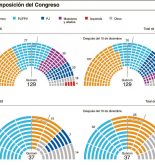Contenidos
Dolar futuro argentina 2019
rofex
Futures and options markets are entities that organize the purchase and sale of derivative contracts, which in most cases are futures contracts and options contracts on futures. In Argentina, the Mercado a Término de Buenos Aires S.A. (Matba) and the Mercado a Término de Rosario S.A. (Rofex) are authorized for this purpose. (Rofex), which are private self-regulated entities whose rules must be approved by the National Securities Commission (CNV) [note 1]. In futures contracts the parties undertake to exchange (buy and sell) a physical or financial asset (called underlying asset), at a determined (certain) price and on a future date pre-established at the time of signing such agreement. In an option contract, one party (the holder), by paying a sum of money (premium), acquires the right (but not the obligation) to require the other party (the writer) to buy (call option) or sell (put option) certain underlying assets (specific assets, futures contracts or indexes) at a predetermined fixed price, either during a predefined period or on a certain date.[5] In a futures contract, the parties agree to exchange (buy and sell) a physical or financial asset (called the underlying asset) at a predetermined (certain) price and on a future date at the time the agreement is signed.
futures market
Futures and options markets are entities that organize the purchase and sale of derivative contracts, which in most cases are futures contracts and options contracts on futures. In Argentina, the Mercado a Término de Buenos Aires S.A. (Matba) and the Mercado a Término de Rosario S.A. (Rofex) are authorized for this purpose. (Rofex), which are private self-regulated entities whose rules must be approved by the National Securities Commission (CNV) [note 1]. In futures contracts, the parties agree to exchange (buy and sell) a physical or financial asset (called underlying asset), at a determined (certain) price and on a future date pre-established at the signing of such agreement. In option contracts, one party (the holder), by paying a sum of money (premium), acquires the right (but does not contract the obligation) to buy and sell the underlying asset at a certain price (certain) and at a future date established at the time the agreement is signed.
how much is the future dollar at
-55.4%2026Argentine peso Dolar forecast for November 2021. The exchange rate for the beginning of the month is 10.000. The high is 10.101, the low is 9.709. The average rate forecast is 9.928. The Argentine Peso Dolar forecast for the end of the month is 9.901, -1.0%.Argentine Peso Dolar forecast for December 2021. The exchange rate for the beginning of the month is 9.901. The high is 10.101, the low is 9.709. The average rate forecast is 9.903. The Argentine Peso Dolar forecast for the end of the month is 9.901, 0.0%.Argentine Peso Dolar forecast for January 2022. The exchange rate for the beginning of the month is 9.901. The high is 10.000, the low is 9.615. The average rate forecast is 9.830. The Argentine Peso Dolar forecast for the end of the month is 9.804, -1.0%.Argentine Peso Dolar forecast for February 2022. The exchange rate for the beginning of the month is 9.804. The high is 9.901, the low is 9.524. The average rate forecast is 9.735. Argentine Peso Dolar forecast for the end of the month is9.709, -1.0%.Bitcoin forecast 2021, 2022, 2023-2025.
cabito
The big question for the market is what will happen to the exchange rate after the elections. More specifically, what will the exchange rate policy be like: will it be a discreet jump of the dollar, or an acceleration of the crawling peg?
Curiously, some believe that the best thing for the Government (at least to reduce the exchange rate tension) is to have a mediocre election or, conversely, for Juntos to have an election that feeds the expectations of a replacement in 2023. Thus, they believe, there would be a PASO 2019 effect, but in reverse.
That, however, could be a short-term initial reaction. Then comes another question: how will the ruling party read the electoral result? If they were indeed defeated, it could be understood internally as a failure for not having gone deeper into ‘the model’ and consequently, a political radicalization that would make the negotiation with the IMF more difficult. And if the ruling party were to win, could it not be argued that they won precisely for not having agreed with the IMF and, consequently, for wanting to continue in the same way? Neither reading would be convenient for the future of the Argentine economy, said Invecq.


